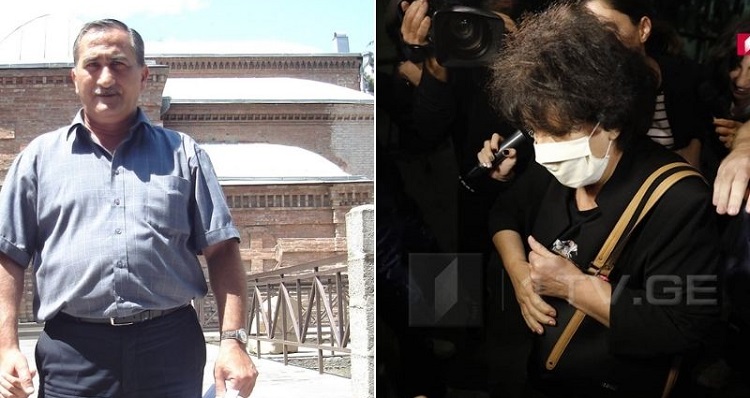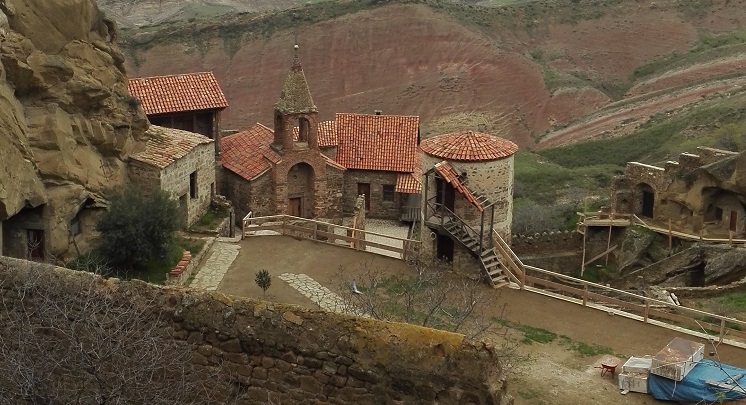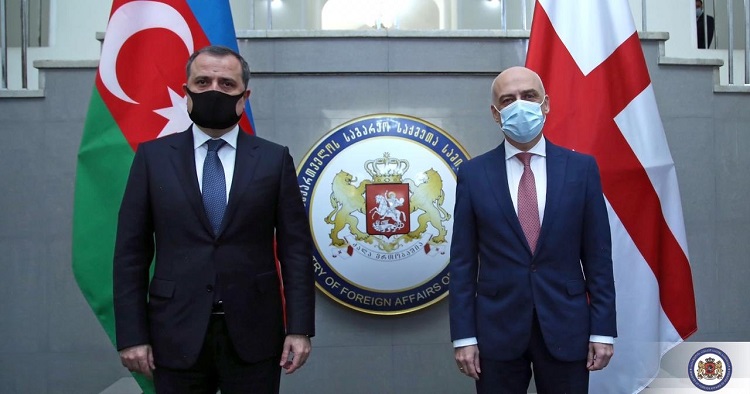2 detained for hiding evidence in Georgia-Azerbaijani border case leading to forfeit of 3,500 ha of land

One of the detainees says that the allegations are groundless. Photo: 1TV.
Two former members working on a state commission charged with demarcating Georgia’s border with Azerbaijan have been detained earlier today by the country’s Chief Prosecutor’s Office.
The Prosecutor’s Office claims that the detainees hid an original map issued in 1937-38 and instead used other maps based on which the border sections between the two countries were agreed ‘against the interests of Georgia and history.’
The detainees are the head of the department for border relations with neighbouring countries of the Ministry of Foreign Affairs of Georgia Iveri Melashvili and a senior inspector in the border protection department of the Ministry of Internal Affairs Natalia Ilichova.
The video has been released by the Chief Prosecutor's Office.
The Prosecutor’s Office says that the investigation was launched on August 17 per information provided by the country’s Defence Ministry.
The Prosecutor’s Office said that a Georgian citizen obtained various maps and documents abroad and handed them to the Ministry of Defence.
The Prosecutor’s Office reported that about 60 individuals were interrogated and dozens of studies were carried out before the detention took place.
What are the details provided by the Prosecutor’s Office in the case?
- Georgian-Azerbaijani administrative border line was changed several times under the Soviet Union and was finally agreed upon back in 1938. In March of 1938 the top governing bodies of the two countries approved an administrative boundary line on a 1:500,000 map.
- Since the collapse of the Soviet Union in 1991 there has been a need for Georgia to agree upon its borders with neighbouring countries that is why a special state commission was created in 1994.
- Georgian and Azerbaiiani state commissions agreed in 1996 to use the agreement reached between the two countries on the administrative boundary line in 1938 for the demarcation of the state border.
- Iveri Melashvili served as the member of the state commission and headed the group of experts along with Ilichova. They were responsible for conducting geodesic and cartographic works. However, they refused to involve cartographists in the activities.
 The Prosecutor's Office says that the case also concerns the disputed David Gareji territory. Photo: Nino Alavidze/Agenda.ge.
The Prosecutor's Office says that the case also concerns the disputed David Gareji territory. Photo: Nino Alavidze/Agenda.ge.
The Prosecutor’s Office says that Melashvili hid the 1938 original map from the commission members and instead used a 1970-80 map in the process of demarcating the border, leading to the forfeit of about 3,500 hectares of lands against Georgia’s interests.
The Prosecutor’s Office says that the commission had the copy of the 1938 map. However, only the original could be admitted as evidence.
Due to the illegal activities of the detainees Georgia faced the risk of losing its historic territories, including ones in David Gareji,” said the Prosecutor’s Office, adding that the crime is punishable by 10-15 years in prison.
The motive behind the alleged action remains unidentified.
Melashvili told Formula TV that the allegations are ‘absurd’.
He stated that the map the Prosecutor’s Office mentioned were handed to the state commission by the country’s border service in the 1990s.
However, he said that the commission rejected the map after studies as it came with errors.
When we compared the map with other maps and carried out other studies, there were 240-300 meter errors,” Melashvili said.
He stated that they returned the map to the border service and the service, allegedly, gave the map to a cleric or some state official back in 2013.
Melashvili said that the issue of the map reemerged in 2014 and ended shortly thereafter.
 Azerbaijani and Georgian FMs met in Tbilisi last month. Photo: Foreign Ministry press office.
Azerbaijani and Georgian FMs met in Tbilisi last month. Photo: Foreign Ministry press office.
I do not know why the issue was raised again after six years,” Melashvili told Formula TV.
On September 24, 2020 Georgian Foreign Minister David Zalkaliani said that new map materials found by Georgia may bring about changes to the Georgian-Azerbaijani 2006-2007 agreement on border issues which was made under the UNM government.
Zalkaliani mentioned the new map materials during the first official visit of Azerbaijani Foreign Minister Jeyhun Bayramov in Georgia last week, expressing hope that the border issue will be settled through consensus.
He stated that the materials have already been sent to Azerbaijan for examination.
Since the collapse of the Soviet Union, out of its four neighbouring states Georgia has agreed upon its borders only with Turkey.
Only two-thirds of the state border has been agreed upon with Azerbaijan so far which on several occasions triggered tension in David Gareji last year.
 Tweet
Tweet  Share
Share